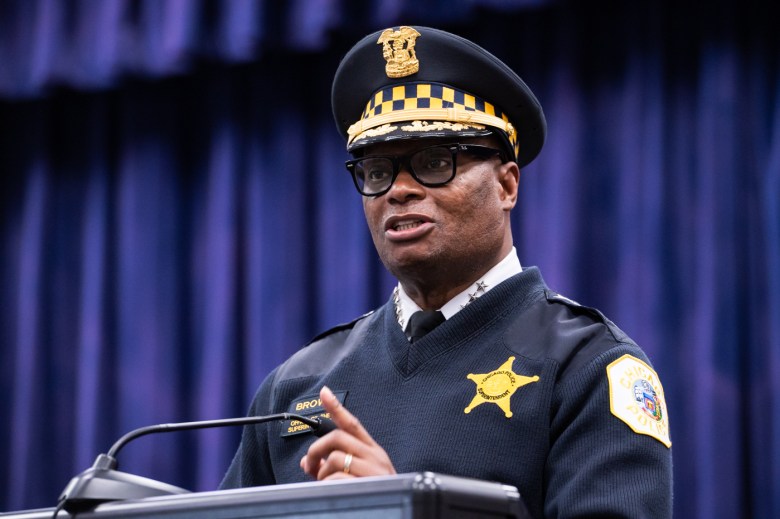CHICAGO — A Chicago police officer and a father of five said on-the-job stress and emotional exhaustion from working 23 days without a break almost led him to a “breaking point” a few weeks ago.
The officer sought counseling. But he and others within the department said they’ve struggled for more than two years as they’ve had to work overtime and their days off have been canceled, leaving them little time to process trauma.
Three Chicago police officers — Andy Dobda, Durand Lee and Patricia Swank — have died by suicide in the past month, highlighting a crisis within the agency, some said.
Officers and mental health professionals said the department is running its forces into the ground. Officials have whittled away officers’ time off — leading to them missing milestones like their children’s graduations and family vacations — while offering inferior mental health care that feels more like a conveyor belt than a culture of care, they said.
“You’re gonna take away things that make us feel better about ourselves, that make life worth living,” the Northwest Side officer said. “Getting [help] was a little step for me. … I hung my head and cried because I needed to be someplace with somebody to have this outpouring.”
A group of aldermen; Ryan Clancy, Swank’s brother; and two widows of police officers who died by suicide will hold a news conference Wednesday where they’ll call for the City Council to host a hearing on mental health challenges among officers.
“You are failing to protect those who are protecting us,” Clancy said in a video to city officials at his sister’s funeral. “It breaks my heart that it’s easier for you to make a statement about the next officer’s passing than to go out and prevent it.”

After Dobda’s death this weekend, Supt. David Brown held a news conference Monday where he defended the agency canceling days off and said the department hopes to soon be able to offer more help.
The Police Department has substance abuse counselors, faith-based counselors and an Employee Assistance Program with officers trained in peer trauma support who are available 24/7, Brown said.
“Police work is tough work. It’s been the most difficult time these last two and a half years to be a police officer,” Brown said. “We will keep doing work to make sure every officer has the support they need.”
There are 11 licensed clinical physicians for the 11,628 officers active in the city, according to police.
The department hopes to hire another 11 clinical physicians, one per district, so they can be a part “of their own culture,” Brown said.

Community-focused. Reader-funded. Journalist-run.
Support Chicago’s neighborhood news. Support Block Club today.
‘You Need That Downtime. Everybody Does’
Twenty Chicago police officers have died by suicide since 2018: six in 2018, four in 2019, two in 2020, four in 2021 and four so far this year, according to the department. A 2017 Justice Department report found the department’s officer suicide rate was 60 percent higher than the national average.
Officers said morale is at an all-time low as scrutiny of police remains high, days off have been canceled, burnout is common and crime remains high.
The department has struggled to retain and hire officers for years. More than 650 officers have retired or resigned this year, with 747 total projected to retire or leave by the end of 2022, according to data shared with Block Club.
Carrie Steiner, a psychologist and owner of First Responders Wellness Center, said she works with Chicago police officers who “have been broken” by the past few years.
“The overall threat of being a police officer has always been high, but it’s extremely high right now,” said Steiner, a former officer. “Officers have been shot at and shot. They feel it’s not a ‘maybe this can happen,’ it’s a ‘when will this happen.’”
Mental health experts said canceled days off is the top complaint they’re hearing from Chicago police officers in crisis. Officers are working 12-hour days, and Brown has repeatedly canceled days off as violence has increased across the city.

At the independent First Responders Wellness Center, officers are routinely missing therapy due to canceled days off, Steiner said.
“They don’t have time to connect to family and friends and recuperate from the stress they’re under,” Steiner said. “You need that downtime. Everybody does.”
Brown said his policy is in step with how past superintendents dealt with police shortages. The practice is limited but necessary as cops “are being shot and shot at, at record levels,” Brown said at Monday’s news conference.
”We cancel days because of the need to make sure our officers are safe on the street,” he said. “You’d rather have someone coming for backup than no one.”
Officers usually have eight of their 104 regular days off canceled during a more violent summertime, Brown said. Another 12 days are cut throughout the year, but furlough and vacation days are untouched, he said.
But that does not take into account that officers are often working 15 or more days in a row, Steiner said.
Effective policing is less about numbers and more about rest, Steiner said.
“Officers feel like they are making mistakes on the street because they’re tired,” Steiner said. “When you’re sleep-deprived, you’re hyper-vigilant, you’re more reactive. You are going to make poor decisions.”

The Far Northwest Side officer said he’s had conversations with colleagues who look like “zombies” because they are drained from working overtime, disturbed by the number of officer suicides and the department’s negative culture around mental health. It all affects their ability to do their job, he said.
“It can’t be good for the community to have officers that are that close to being suicidal. … It’s not healthy for them, either,” he said.
Another officer who works in the 14th District said he only had three days off from the beginning of June to July 8, and none of them were voluntarily canceled.
“Personally, it’s hard for officers now … with canceled days off, no support from the higher-ups, short notice on days canceled,” the officer said. “That [stress] is carrying over to the household.”
Alexa James, chief executive officer of the National Alliance on Mental Illness Chicago, said she’s worked with thousands of city officers who have “pushed down grief” because they don’t have time to process and seek therapy.
Nonstop work with daily exposure to violence can have a spiraling effect, James said.
“They’re taught to keep it in and keep going,” James said. “Alone in their cars.”
Police Department Lacks ‘Culture Of Wellness,’ Some Say
Some officers also said more sensitivity from leaders is needed to bridge the divide. Brown didn’t address officers who showed up at the morgue Sunday to honor the latest fallen officer, which felt careless, some officers said.
“He needs to address people in roll calls and be more empathetic,” said a veteran officer.
Don Terry, a Police Department spokesman, said Brown does not respond in the news to comments from third parties.
Mental health services offered internally by the Police Department are seeing their “highest utilization” ever, Dr. Robert Sobo, director of the department’s Employee Assistance Program, said at Monday’s news conference.
But mental health professionals said that’s not an indicator of success when suicide rates remain steady and services offer Band-Aids instead of cultural shifts.
James was picked in September 2020 as the department’s senior adviser on wellness, after Deputy Chief Dion Boyd fatally shot himself in his office. She left a year later to focus on helping officers and others through the National Alliance on Mental Illness Chicago.
Since 2017, James has studied mental health services offered by large police departments around the country, traveling from New York to San Diego, she said. In April, she presented a plan to improve police mental health services to Mayor Lori Lightfoot, Brown and other top brass, she said.
The plan sought to establish a “culture of wellness” by launching a wellness office within the Police Department, creating a mental health app for transparency and confidentiality, providing more debriefing following traumatic incidents and engaging recruits with mental health support staff, among other steps, James said.
Brown and others “were supportive, then it started trickling down the line,” James said.
“There was absolutely progress made. … I think they identified how important it is to have wellness as part of an organization,” James said. “But I don’t know if people identified change or if the culture of the Police Department became more healthy.”
What the department is offering now is not working, officers said. While some found peer support through the Employee Assistance Program to be a good start, some said counselors were overbooked and often breached confidentiality.
One officer tried to schedule an appointment with a counselor through the program to get help with post-traumatic stress disorder triggered from the job, but scheduling didn’t line up. He stopped trying when counselors weren’t available when he needed them.
“They tell us to go talk to a complete stranger about [mental health], and those people you can’t even get to see,” another officer said. “There needs to be alternatives to department services — [counselors] that go to districts each week and meet the officers and create relationships.”

Steiner is working to open a satellite of her wellness center at the Fraternal Order of Police office in the coming weeks, she said. The Police Department could be investing more in outside counseling services to fit individual needs and avoid conflicts of interest, she said.
“Officers are worried their information is going to be shared, and because they work for [the Police Department], I think counselors feel pressure to get people back on the street,” Steiner said. “There’s a breakdown of trust. They feel like the [Employee Assistance Program] isn’t there to really support you.”
The police union declined to comment.
Police said they’re concerned those who get evaluated or receive mental support could risk losing their FOID card if they are seen as unstable, get their gun taken away or even lose their job — so many stay quiet.
James said the department has struggled to hit its goal of providing 22 clinical physicians, given the unique qualifications to work with police trauma and “it’s really hard to hire right now in health care.”
“What I do know Supt. Brown is aware of is there are a lot of hurting people in his department and, historically, in his line of work,” James said. “What I don’t know is if he has access to the tools he needs to make people feel comforted.”
Mental health experts and officers called on Police Department leaders to be more transparent about what the agency lacks — and to think about mental health with a greater sense of humanity.
“They’re checking all the boxes, saying, ‘If you need help, you have access to this.’ That’s not enough to feel supported,” Steiner said. “If we want the Police Department to make better decisions, they have to treat officers well.”
James said she’s having challenging conversations with officers on a daily basis, some who are responding to the scenes of their colleagues’ suicides.
“When I talk to officers, they don’t feel seen and heard,” James said. “It’s the most traumatic experience to feel invisible.”
Support Local News!
Subscribe to Block Club Chicago, an independent, 501(c)(3), journalist-run newsroom. Every dime we make funds reporting from Chicago’s neighborhoods. Already subscribe? Click here to gift a subscription, or you can support Block Club with a tax-deductible donation.
Listen to the Block Club Chicago podcast:


